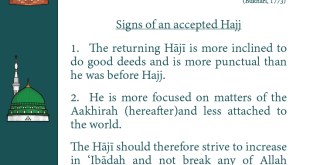The Farewell Hajj – Part 1
When Rasulullah Sallallahu ‘Alayhi Wa Sallam expressed the intention of Hajj
When Rasulullah Sallallahu ‘Alayhi Wa Sallam resolved to perform Hajj in the 10th year of Hijrah, he announced to the people his intention to undertake the pilgrimage. This news swiftly spread far and wide throughout the vicinity of Madinah Munawwarah, prompting believers from all corners to converge on the blessed city. The influx of people was so immense that the roads filled, teeming with countless pilgrims eager to join Rasulullah Sallallahu ‘Alayhi Wa Sallam’s caravan on this blessed journey.
Accompanying him were his noble wives Radiyallahu ‘Anhunna, and as the journey progressed, more and more individuals continued to join the procession. Imam Nasa’i Rahmatullahi ‘Alayh narrates on the authority of Sayyiduna Jabir Radiyallahu ‘Anhu that when Rasulullah Sallallahu ‘Alayhi Wa Sallam announced his intention to perform Hajj, such was the response that there remained scarcely anyone capable, either by mount or foot, but did not heed the call. (Sunan Nasa’i Hadith No. 2757, p. 669)
Everywhere one looked, ahead, behind, to the right and left, there were only people as far as the eye could see. Their numbers were beyond count. In his previous battle, the Battle of Tabuk, the participants numbered 100,000. The farewell Hajj took place after the battle of Tabuk, and most likely, this figure increased during the pilgrimage. Various traditions estimate the number of pilgrims differently; some suggest 114,000, others 124,000, whilst another account places the figure at 130,000. (Hujjatal Wadaa Umraatun Nabi ﷺ p. 18)
The commencement of the journey
Before embarking on this journey, Rasulullah Sallallahu ‘Alayhi Wa Sallam instructed regarding the designated boundaries (Meeqaat), as narrated by Ibn Majah on the authority of Sayyiduna Jabir Radiyallahu ‘Anhu that Rasulullah Sallallahu ‘Alayhi Wa Sallam said: ‘The people of Madinah are to assume Ihram from Zul Hulayfah, the people of Al-Sham from Al-Juhfa, the people of Yemen from Yalamlam, the people of Najd from Qarn, and the people of the East from their respective tribes.’ (Sunan Ibn Majah – Hadith No.2915, p.317)
Additionally, in Sahih Bukhari, Sayyiduna Ibn ‘Umar Radiyallahu ‘Anhuma narrates the following: A man stood up and asked the Nabi of Allah Sallallahu ‘Alayhi Wa Sallam ‘From where should we enter Ihram for Hajj?” Rasulullah Sallallahu ‘Alayhi Wa Sallam replied that the people of Madinah should do so from Zul Hulayfah. (Sahih Bukhari – Hadith No. 133, p. 61)
Before departure, he appointed Sayyiduna Abu Dujaana and possibly Sayyiduna Saba’ bin Arfata Radiyallahu ‘Anhuma as his deputies in Madinah. (Seerat Ibn Hisham, p. 601 V2)
Setting out from Madinah via al-Shajarah during the day, a significant location linked with the birth of Muhammad bin Abu Bakr Radiyallahu ‘Anhu, the son of Hadhrat Abu Bakr Radiyallahu ‘Anhu, from the womb of Hadhrat Asma bint ‘Umays Radiyallahu ‘Anha. It was marked by an acacia tree situated six miles away from Madinah. It was common for the Nabi of Allah Sallallahu ‘Alayhi Wa Sallam to stop there for the purpose of adorning his Ihram. (Mu’jam al-Buldaan, p. 325, vol. 3)
They departed from Madinah Munawwarah on a Saturday after Zuhr, either on the 24th or, as per the preferred opinion, on the 25th of Zul Qa’dah. There were 29 days in that particular month, and the first of Zul Hijjah was a Thursday. The Nabi of Allah Sallallahu ‘Alayhi Wa Sallam reached Makkah Mukarramah days later on Sunday the 4th of Zul Hijjah, and the 9th of Zul-Hijjah i.e. the day of Arafat fell on a Friday. (Al Bidayah Wan Nihayah, p. 414, vol. 11)
Before departing from Madinah, Rasulullah Sallallahu ‘Alayhi Wa Sallam performed four Rak’aat of the Zuhr prayer and delivered a sermon, guiding the people regarding the regulations of Ihram. This occurred during the 10th year of the Hijra. Rasulullah Sallallahu ‘Alayhi Wa Sallam was dressed in humble attire, his blessed hair neatly brushed and oil applied. Upon leaving Madinah Munawwarah, he halted at Zul-Hulayfah to establish camp.
 Wifāq ul Ulāma (SA) ASSOCIATION OF SOUTH AFRICAN 'ULAMA
Wifāq ul Ulāma (SA) ASSOCIATION OF SOUTH AFRICAN 'ULAMA


